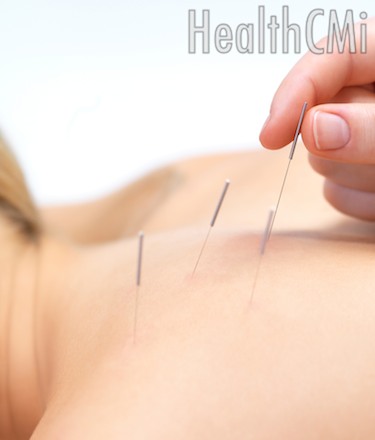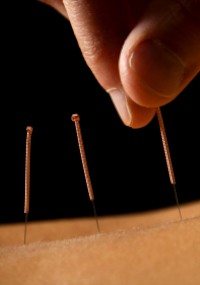Acupuncture has long lasting effects in reducing hot flashes for breast and prostate cancer patients.  Published in Supportive Care in Cancer, researchers evaluated 222 publications and chose 6 quality studies from this data as the basis for the investigation. All 6 studies were weighed for inclusion based on randomization, withdrawals and drop-outs, double-blinding and other criteria for the selection of quality research. The researchers discovered that acupuncture caused significant reductions in the frequency of hot flashes. In addition, the therapeutic effects lasted on average more than 6 months after the cessation of acupuncture treatments. The researchers concluded that acupuncture is both safe and effective for the treatment of hot flashes associated with cancer therapy.
Published in Supportive Care in Cancer, researchers evaluated 222 publications and chose 6 quality studies from this data as the basis for the investigation. All 6 studies were weighed for inclusion based on randomization, withdrawals and drop-outs, double-blinding and other criteria for the selection of quality research. The researchers discovered that acupuncture caused significant reductions in the frequency of hot flashes. In addition, the therapeutic effects lasted on average more than 6 months after the cessation of acupuncture treatments. The researchers concluded that acupuncture is both safe and effective for the treatment of hot flashes associated with cancer therapy.
Over 50% of perimenopausal and postmenopausal women have hot flashes. They are more common and more severe in women with breast cancer. Hot flashes are caused, in part, by cancer therapy medications including tamoxifen. Hormone therapies are often used to control the hot flashes but may cause side effects such as the increased risk of cardiovascular disorders and a higher incidence of breast cancer. The researchers note that acupuncture is safer and no major side effects occurred.
Elderly men experience hot flashes and the incidence increases significantly in men treated for prostate cancer with castration. Surgical and medical castration patients have a 58-80% incidence of hot flashes. The researchers note that this type of hot flashes “usually persists more than 5 years.”
The researchers note that acupuncture is a “treatment option that does not cause any serious adverse side effects….” They cited research suggesting that the mechanism for the effective action of acupuncture on the reduction of hot flashes may be the ability of acupuncture to increase “central β-endorphins.” They note that evidence suggests that the endorphins stabilize thermoregulation via cortical pathways in the hypothalamus. The researchers note that although studies demonstrate that acupuncture significantly reduces hot flashes in frequency, intensity and duration, it is not as effective as hormone therapy. The researchers also note that acupuncture has been shown to be significantly more effective than placebo controls for the treatment of hot flashes. Additionally, this study demonstrates that acupuncture has similar beneficial clinical effects as other nonhormonal treatment options including medications.
Taking a look at each of the investigations, there is a consistent finding of acupuncture effectively reducing hot flashes without any serious side effects. The effects lasted for a minimum of 3 months after treatment and up to no less than 9 months after completion of acupuncture treatments. The average improvement lasted approximately 6 months after completion of acupuncture treatments.
Research entitled Randomized, controlled trial of acupuncture for the treatment of hot flashes in breast cancer patients published in the Journal of Clinical Oncology documented a 30% reduction of hot flashes for women with breast cancer. The effects lasted for at least 5 months as measured by a follow-up appointment 5 months after completion of the last acupuncture treatment.
Research entitled Acupuncture for the treatment of hot flashes in breast cancer patients, a randomized, controlled trial published in Cancer Research and Treatment reported a reduction of hot flashes from 9.5 on average per day to 3.2 per day. Initially, the reduction was to 4.7 per day following 10 weeks of acupuncture therapy but continued to reduce to 3.2 flashes per day as measured in a 3 month follow-up appointment.
Research entitled Vasomotor symptoms decrease in women with breast cancer randomized to treatment with applied relaxation or electro-acupuncture: a preliminary study had similar findings. Women received 12 weeks of acupuncture care and the incidence of hot flashes decreased from 8.4 per 24 hour period to 4.1 after three months of care. At a 12 week follow-up appointment after the cessation of care, the incidence of hot flashes further reduced to 3.5 per 24 hour period.
Research entitled Long-term follow-up of acupuncture and hormone therapy on hot flashes in women with breast cancer: a prospective, randomized, controlled multicenter trial measured a reduction of 9.6 hot flashes per day to 4.3 after 12 weeks of acupuncture therapy. A 2 year follow-up measured a further reduction to 2.1 hot flashes per day.
Research entitled Reducing vasomotor symptoms with acupuncture in breast cancer patients treated with adjuvant tamoxifen: a randomized controlled trial measured a 30% reduction of hot flashes in women receiving acupuncture therapy. The initial intake measured an average of 8.4 flashes per day in the group of 38 women. This reduced to 5.7 flashes per day as a result of acupuncture therapy. A total of 36 of the 38 women returned for a 3 month follow-up appointment and demonstrated a further reduction to 5.6 hot flashes per day. 
A randomized study of 31 men with prostate cancer and hot flashes measured a significant improvement through the use of acupuncture care. Two separate approaches to acupuncture care were compared. Electroacupuncture was compared with manual traditional acupuncture. The electroacupuncture group reduced from the initial 7.4 flashes per day to 4.1 flashes per day, measured at the last acupuncture treatment. At a six month follow-up after the cessation of care, hot flashes occurred at a rate of 4.7 per day. A 9 month follow-up documented 6.2 flashes per day. The 9 month follow-up documented a 17% improvement over the initial baseline.
The traditional acupuncture group showed greater improvement than the electroacupuncture group for men with prostate cancer and hot flashes. The initial baseline started at 6.4 per day and reduced to 3.4 at the end of care. A 9 month follow-up measured a sustained 34% reduction of hot flashes at 4.1 per day.
All 6 of the studies demonstrated a minimum of a 30% improvement from the start of care for an average of 5.4 months as measured in follow-up appointments. The average improvement from the initiation of care to the last treatment averaged 43.2%. The researchers note that, “The reduction of hot flashes after acupuncture from our analyses indicated an almost 50%reduction of the number of hot flashes per 24 h and sustained at the last follow-up after the end of acupuncture. Thus, the effects of acupuncture are at least similar to other nonhormonal therapies [2–7] but with very few side effects. Acupuncture can be considered as a treatment option for
troublesome hot flashes in patients with breast or prostate cancer.”
Other researchers have drawn similar conclusions. A Yale University/University of Pittsburg study of women with hot flashes undergoing breast cancer treatments reveals that women receiving acupuncture have significantly less hot flashes. The randomized, placebo-controlled clinical trial collected data “in the National Institutes of Health funded General Clinical Research Center (GCRC) associated with Yale School of Medicine and Yale New Haven Hospital (YNHH). The study was approved by the Yale University Institutional Review Board (IRB). Interviews, acupuncture treatments, educational sessions, and laboratory test specimen collection for all study participants took place at the GCRC.” The researchers discovered that women receiving acupuncture on average had a 30 percent reduction of hot flashes.
References:
1. Frisk, Jessica W., Mats L. Hammar, Martin Ingvar, and Anna-Clara E. Spetz Holm. "How long do the effects of acupuncture on hot flashes persist in cancer patients?." Supportive Care in Cancer (2014): 1-7.
2. Kronenberg F, Fugh-Berman A (2002) Complementary and alternative medicine for menopausal symptoms: a review of randomized, controlled trials. Ann Intern Med 137:805–813.
3. North American Menopause Society (2004) Treatment of menopause-associated vasomotor symptoms: position statement of The North American Menopause Society. Menopause 11:11–33.
4. Mom CH, Buijs C, Willemse PHB et al (2006) Hot flashes in breast cancer patients. Crit Rev Oncol Hematol 57:63–77.
5. Wong VC, Lim CE, Luo X et al (2009) Current alternative and complementary therapies used in menopause. Gynecol Endocrinol 25:166–174.
6. Albertazzi P (2007) Non-estrogenic approaches for the treatment of climacteric symptoms. Climacteric 115–120. doi:10.1080/ 13697130701440980.
7. Albertazzi P (2006) Noradrenergic andsertonergicmodulation to treat vasomotor symptoms. J Br Menopause Soc 12:7–11.
8. Deng VA, Yeung S et al (2007) Randomized, controlled trial of acupuncture for the treatment of hot flashes in breast cancer patients. J Clin Oncol 25:5584–5590.
9. Hervik J, Mjåland O (2009) Acupuncture for the treatment of hot flashes in breast cancer patients, a randomized, controlled trial. Breast Cancer Res Treat 116:311–316.
10. Liljegren A, Gunnarsson P, Landgren BM et al (2012) Reducing vasomotor symptoms with acupuncture in breast cancer patients treated with adjuvant tamoxifen: a randomized controlled trial. Breast Cancer Res Treat 135:791–798.
11. Nedstrand E, Wijma K, Wyon Y et al (2005) Vasomotor symptoms decrease in women with breast cancer randomized to treatment with applied relaxation or electro-acupuncture: a preliminary study. Climacteric 8:243–250.
12. Frisk J, Carlhäll S, Källström A-C et al (2008) Long-term follow-up of acupuncture and hormone therapy on hot flashes in women with breast cancer: a prospective, randomized, controlled multicenter trial. Climacteric 11:166–174.
13. Frisk J, Spetz AC, Hjertberg H et al (2009) Two modes of acupuncture as a treatment for hot flashes in men with prostate cancer-A prospective multicenter study with long-term follow-up. Eur Urol 55:156–163.
14. Cohen Su M, Rousseau Ma E, Berg Ju A, Jolivet Ri , Dixon Ly , Vulte Je , Kern II Jo . Menopausal Symptom Management With Acupuncture For Women With Breast Cancer . WebmedCentral ALTERNATIVE MEDICINE 2011;2(2):WMC001544.


